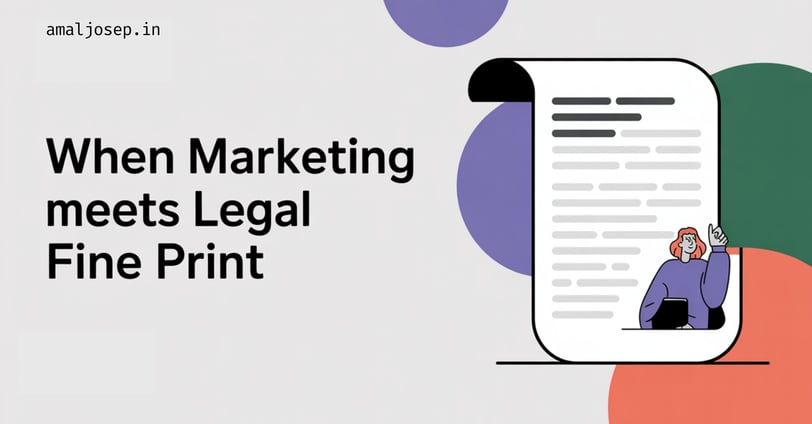When Marketing Meets the Legal Fine Print | Amal Jose P
Amal Jose P


In the fast-paced world of marketing, we chase creativity. We think in slogans, visuals, reels, virality. But in that rush to be clever or attention-grabbing, we often overlook something less exciting—but absolutely essential: the law.
And I get it. Legal compliance doesn’t feel sexy. But here’s the uncomfortable truth:
One poorly worded ad can cost you more than your entire campaign budget.
The Line Between Clever and Misleading
Let’s start with a basic example:
You see an ad that says “Lose 10 kilos in 10 days — 100% Guaranteed!”
It grabs attention. It sounds magical. But it also breaks multiple advertising norms.
In India, such claims violate ASCI (Advertising Standards Council of India) guidelines and could be deemed misleading under the Consumer Protection Act, 2019. If a customer acts on this and sees no results, the brand can face serious legal trouble — from fines to loss of credibility.
If you're a marketer, ask yourself:
Can you legally prove what you’re promising?
Influencers: Disclosure Isn’t Optional Anymore
We’re in the age of the creator economy. Influencers are today’s billboards. But many still forget (or ignore) the legal requirement to clearly disclose paid partnerships.
As per ASCI’s Guidelines for Influencer Advertising in Digital Media, any form of paid promotion must be tagged as such — #ad, #sponsored, or “Paid Promotion” must be visible and upfront.
Hidden disclaimers or ambiguous captions like “Thanks [Brand]” don’t cut it anymore.
Brands and influencers both risk fines and bans for non-compliance. Worse? They risk losing the trust of an increasingly aware audience.
Creative ≠ Copyright-Free
In the name of "inspiration", many brands reuse memes, images, music, and content — without proper licensing. That’s not smart marketing, it’s IP infringement.
A few seconds of copyrighted music in your reel, a Getty image in your brochure, or a film clip in your ad can trigger takedowns, copyright strikes, or lawsuits. I’ve seen startups spend lakhs fixing issues that could’ve been avoided with a ₹500 stock license.
Your idea may be unique, but always ask:
Did we license what we didn’t create?
The Solution? Bring Legal to the Table Early
Legal isn’t there to say “no” — it’s there to help you say “yes” more smartly.
If you’re launching a campaign, product, or creative piece, loop in your legal advisor or compliance partner during the concept stage, not after going live.
Here’s a quick legal checklist I recommend for every marketing campaign:
✔️ Are your claims provable and within legal advertising guidelines?
✔️ Is your content free of copyright issues (images, music, design)?
✔️ Are influencer collaborations disclosed properly?
✔️ Are you storing, processing, or retargeting personal data lawfully?
Final Thoughts
The most successful brands today aren’t just creative — they’re carefully creative.
They understand that marketing isn’t just about making noise — it’s about building trust. And trust can only survive when your message, your methods, and your mindset are all aligned with the law.
If you're a marketer, agency, or business owner reading this — it’s time to give legal its rightful seat at the strategy table.
Because in marketing, nothing kills a great idea faster than a legal notice.
🔗 Want your campaigns legally sound and creatively strong?
Let’s connect — write to me at hello@amaljosep.in